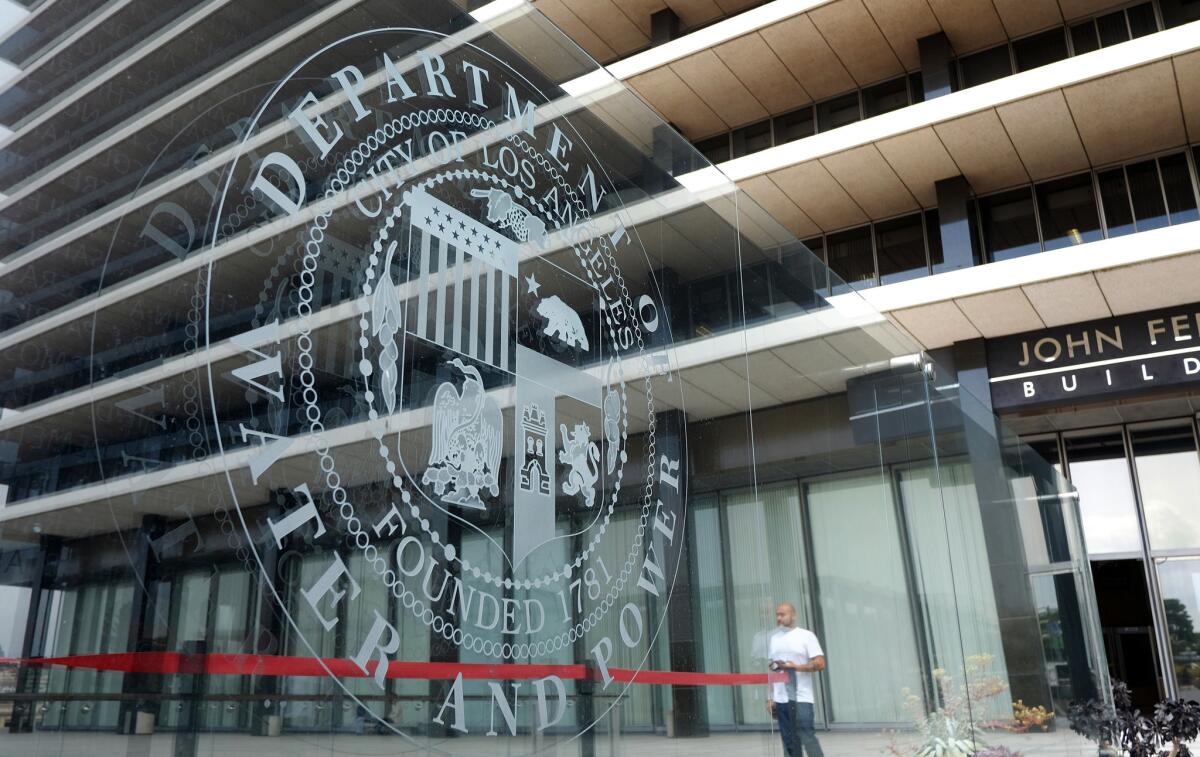Ballot plan would expand DWP board and allow its members to get paid

- Share via
The board that oversees the Los Angeles Department of Water and Power would have more members, shorter terms and be harder for L.A.’s mayor to fire, under a ballot proposal backed Thursday by a City Council panel.
The council’s Rules, Elections, Intergovernmental Relations and Neighborhoods Committee voted to put together a ballot measure for the Nov. 8 election that would rework the way DWP board members are chosen and removed.
Under the plan, the DWP’s board would go from five members to seven. Board members’ terms would be scaled back from five years to three. And for the first time, DWP board members — who are chosen by the mayor and currently serve as volunteers — would be eligible for a monthly stipend.
A separate plan, which would not need voter approval and instead be included in a city ordinance, would set that pay at $24,000 per year.
Council President Herb Wesson described the package of changes as a way of making the DWP more efficient and effective. Giving the DWP more members, he added, would also expand the panel’s ethnic, economic and geographic makeup.
“With seven, you get a more diverse board,” Wesson added. “And I do think that it’s important, moving forward, that we incorporate diversity in everything we do.”
The committee’s plan would prohibit the mayor from firing DWP board members without a council vote. Still, its most controversial provision would allow the council to pursue new exemptions to — or outright abandonment of — the civil service system currently used for hiring and firing at the utility.
The Coalition of L.A. City Unions, which represents civilian employees at non-DWP city agencies, denounced that idea.
Coalition spokesman Victor Gordo said the ballot plan, if approved, would be the first step toward eliminating the utility’s reliance on the civil service system, which was established to protect ratepayers from corruption and patronage in hiring.
Gordo said the loss of a civil service system at the DWP would mean that utility workers — most of whom are represented by International Brotherhood of Electrical Workers Local 18 — would no longer be held accountable under the disciplinary system used for the rest of the civilian city workforce.
That means the city’s Civil Service Commission would no longer handle cases involving DWP workers who are fired or otherwise punished for wrongdoing, Gordo said. “”That information will no longer be public,” he added.
Wesson, for his part, said the proposed ballot measure would simply initiate a “conversation” about hiring and the civil service rules at the DWP. “To say that it is the elimination [of civil service] is really premature,” he said.
An IBEW representative said the union, which represents 90% of DWP workers, generally supports the committee’s proposals.
“IBEW Local 18 ... strongly believes that a hiring and discipline process that holds the department and its leadership accountable is an important and necessary part of any reform package,” said union spokesman Chris Modrzejewski. “Today was a step forward in that process.”
Thursday’s vote capped months of hearings on the utility and ways of making it more effective. Over the past three years, the DWP experienced a disastrous rollout of a new billing system and received widespread complaints about deteriorating pipes and other infrastructure.
Meanwhile, utility executives have portrayed the contracting and hiring processes as too cumbersome.
Wesson’s committee took steps to address some of those complaints, moving to grant more power to the DWP’s board and its general manager. One proposal, for example, would give the utility’s top executive authority to approve contracts of up to $5 million without board oversight.
The current maximum is $150,000.
The committee also moved to eliminate routine council oversight of DWP franchises, concessions, permits and leases. Under the proposal, those decisions would rest with the utility’s board.
Nevertheless, council members would retain the power to review any contract or agreement whose value exceeds $15 million if they had specific concerns.
ALSO
Prosecutor urges death for ‘Grim Sleeper’ serial killer
Ex-LAPD officer pleads guilty to trying to smuggle man across Mexican border
11 deaths at Huntington Hospital among patients infected by dirty scopes, city report says
Twitter: @DavidZahniser
More to Read
Sign up for Essential California
The most important California stories and recommendations in your inbox every morning.
You may occasionally receive promotional content from the Los Angeles Times.











